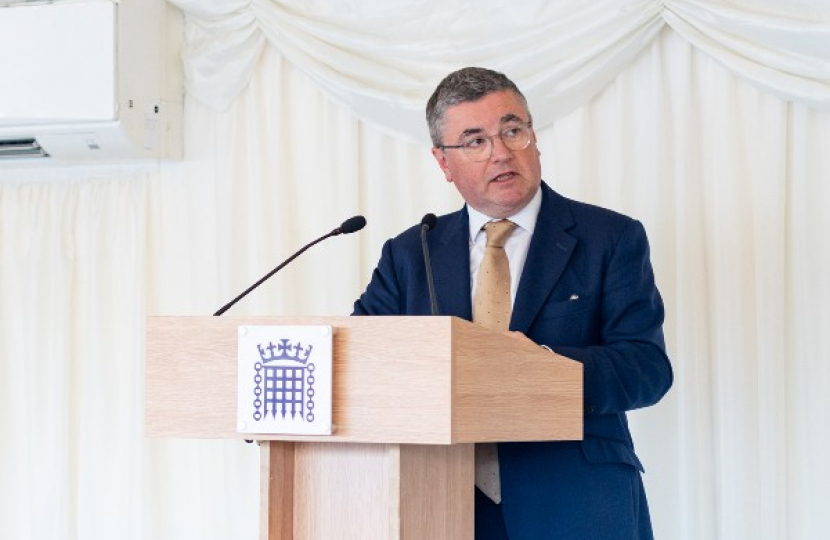
South Swindon MP and Chair of the All-Parliamentary Group on Learning Disability, Sir Robert Buckland, joined the charity Mencap to mark Learning Disability Week and committed to support ending the inappropriate detention of people with a learning disability and/or autism in mental health hospitals.
Attending Mencap’s Learning Disability Week reception in Parliament on Monday 19th June, Sir Robert spoke with people who have a learning disability, families, and carers about the crisis of people who are trapped in mental health hospitals, due to a lack of the right care and support in the community.
In NHS Bath and North East Somerset, Swindon and Wiltshire there are currently 30 adults with a learning disability and/ or autism in inpatient units.
There are currently over 2,000 people with a learning disability and/or autism in England detained as inpatients in mental health hospitals with an average length of stay more than five years.
Many people in these units are subjected to over-medication, inappropriate restraint, and seclusion. The failure to transform care means that people with a learning disability are at increased risk of abuse and neglect in inpatient settings.
Following the abuse scandal at Winterbourne View, which was exposed by BBC Panorama 12 years ago, the Government promised to transform care and enable people with a learning disability and/or autism to move out of hospitals and back into their communities with the right support. However, targets have repeatedly been missed. The latest commitment from the Government and NHS is to reduce the number of people with a learning disability and/or autism in mental health hospitals by half by March 2024. But Mencap has estimated that the government is on track to miss their target by 4 years. The current rate of progress would see the target met by November 2028 at the earliest.
Many of the families who attended have loved ones who have been inappropriately detained in mental health inpatient units. Families were there to tell parliamentarians that enough is enough, there must be urgent action to end this human rights scandal. Families are demanding a revamped Government Action Plan and together with people with a learning disability and those working in the sector they are identifying what actions need to be front and centre to get the change everyone wants to see: people being supported to live life in the community, with the right support, close to family and friends.
Sir Robert Buckland said:
“As chair of the All-Parliamentary Group on Learning Disability, I am glad to be supporting Mencap in highlighting this distressing situation, which needs to end.
“I am calling on the government to urgently review and strengthen the Building the Right Support Action Plan to ensure that people with a learning disability and/ or autism get the right support at the right time in the community, with an important focus on early intervention and prevention.”
Beckii Davis’ brother Elliot was detained inappropriately in a mental health unit for 4.5 years. Beckii is one of the many families campaigning for the government to bring an end to this cruel treatment, she said:
“I was told by Elliot’s community nurse, it wouldn’t be for long, they would review his medication and he’ll be in and out.
“Unfortunately, that wasn’t the case, and he was in a mental health hospital for 4 and a half years.
“The fight to get Elliot out was the hardest fight I have ever been in. No matter how hard I tried, what we were saying was falling on deaf ears.
“We were made to feel that we had no idea, although we had over 20 years’ experience and know Elliot better than anyone. Elliot was harmed, misunderstood, and segregated.
“When Elliot becomes distressed now; he automatically puts himself on the floor so that he doesn’t get hurt. It lives within him daily.
“I struggle to trust that no one will cause him harm.”
Analysis by the charity Mencap based on NHS data and current trends shows that the number of people with a learning disability and/or autistic people locked away would need to reduce by 615. This would mean, on average the reduction in the number of patients each month would need to quadruple, making it almost impossible for the government to deliver their promise.
-ENDS-
For further information or to arrange interviews, please contact the Mencap press office on 020 7696 5414 or [email protected] or for out of hours 07770 656 659.
For more information about learning disability week please see: www.mencap.org.uk
Notes to editors
About Mencap:
There are approximately 1.5 million people with a learning disability in the UK. Mencap works to support people with a learning disability, their families and carers by fighting to change laws, improve services and access to education, employment and leisure facilities. Mencap supports thousands of people with a learning disability to live their lives the way they want: www.mencap.org.uk
For advice and information about learning disability and Mencap services in your area, contact Mencap’s Freephone Learning Disability Helpline on 0808 808 1111 (10am-3pm, Monday-Friday) or email [email protected].
What is a learning disability?
· A learning disability is a reduced intellectual ability which means that people might need support with everyday tasks – for example shopping and cooking, or travelling to new places – which affects someone for their whole life;
· Learning disability is NOT a mental illness or a learning difficulty, such as dyslexia. Very often the term ‘learning difficulty’ is wrongly used interchangeably with ‘learning disability’;
· People with a learning disability can take longer to learn new things and may need support to develop new skills, understand difficult information and engage with other people. The level of support someone needs is different with every individual. For example, someone with a severe learning disability might need much more support with daily tasks than someone with a mild learning disability.
Other Key stats:
- In NHS Bath and North East Somerset, Swindon and Wiltshire there are currently 30 adults with a learning disability and/ or autism in inpatient units, which translates to an adult inpatient rate of 45 adults with a learning disability and/or autism in mental health hospitals per million adults in the population.
- The Government target is for the adult inpatient rate to be no more than 30 adults with a learning disability and/or autism in mental health hospitals per million adults in the population, by March 2024.
The national picture also masks a postcode lottery of care around the country. There are 42 Integrated Care Systems (ICSs) across the country, which are local partnerships designed to deliver joined up health and care services to improve lives, Mencap’s analysis has revealed that of these:
- More than half (55%) of ICSs have not hit the target set for March 2020 for the maximum number of adults with a learning disability and/or autistic people in inpatient units ii
- 29% of ICSs are going in the wrong direction (with an increase in adult inpatient rate) iii
- Based on the current rate of progress, a 50% reduction won’t be achieved until at least November 2028i
Notes on the data:
i Data available from https://digital.nhs.uk/data-and information/publications/statistical/learning-disability-services-statistics. Latest data analysed was published on 18/5/2023.
ii The 2020 target was an adult inpatient rate of 37 adult inpatients with a learning disability and/or autistic people per million adult population). Target was set to be reached by March 2020, having been delayed from March 2019, having been set in October 2015.
iii In the April 2021 release of the Assuring Transformation dataset the figures are broken down by Integrated Care (ICS) for the first time, with data going back to November 2020. 31 of the 48 original Transforming Care Partnerships (TCP) share the same constituent Care Commissioning Groups (CCG) as an ICS. Where this is the case, we have continued the data from TCP through into ICS meaning that the data goes back to August 2019. Where an ICS does not have a preceding TCP with the same CCGs in it, the data starts at the earliest available published at an ICS level. Where we have stated that an ICS is going up it is based from the point of the earliest available data.




